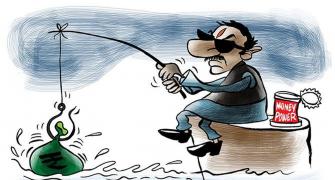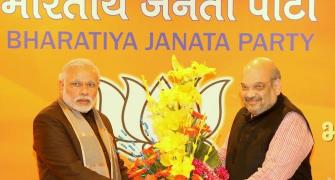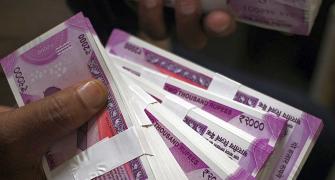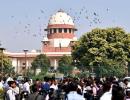'It's not really going to bring about purity in the election process.'

Senior Supreme Court Advocate Dushyant Dave tells Prasanna D Zore/Rediff.com why Thursday's Supreme Court strong>judgment holding electoral bonds unconstitutional may not bring in transparency and accountability in the funding of elections in India.
A five-judge Constitution bench headed by Chief Justice Dr D Y Chandrachud unanimously held that the electoral bond scheme, notified by the Government of India on january 2, 2018, is violative of Freedom of Speech and expression under Article 19(1)(a) of te Constitution.
Will the Supreme Court annulling the electoral bonds and declaring them as unconstitutional bring in transparency and accountability in the funding of elections in India?
On the face of it this is a very remarkable and welcome judgment. But this judgment is too little, too late.
The ruling party will continue to get its source of funding irrespective of what the Supreme Court judgment is and the Opposition will continue to get a smaller share of donations made to political parties by corporates.
Given the environment of fear -- the fear of the income tax department, enforcement directorate -- that we live in today, corporates, willingly or unwillingly, will continue to favour the ruling party.
I don't see this judgment -- a remarkable one indeed -- could bring any level playing field or objectivity (transparency and accountability) to the election process (the way elections are funded in India).
The Supreme Court has also asked the State bank of India, the only bank allowed to issue electoral bonds, to furnish the names of all those donors to the Election Commission and the latter to publish these names by March 31.
Do you think this will help expose the alleged connection between the way the government formulated its policies and the donations made via electoral bonds by the corporates to the ruling party?
There is no doubt that in these kinds of relationships that industrial houses have with the political parties there is always a strong presence of quid pro quo.
It is the media which has to find out if a particular corporate gave sizeable money through electoral bonds (to the ruling party).
What is the benefit it (the corporate received as quid pro quo) received? Did it get more mines? Did it get other government contracts, etc?
But that is an exercise which nobody (the mainstream media) really does in this country anymore. We have to really see that this kind of a quid pro quo must stop. Otherwise the resources which are supposed to be equally distributed are not distributed equally to bring about a balanced economic growth in the country.
That is why some corporates become far more powerful than the other corporates do. I think the State Bank's figures will reveal who are these people (corporates who made huge donations to the ruling party).
Then the media has to find out how they have benefited and that's very easy to put two plus two and to really let the country know that these people were funding the party in power for gains and not really genuinely for supporting the election process.
How big a setback is this for the BJP, which reportedly has got the major share -- almost 95 per cent of all electoral bonds issued by the SBI since their inception -- of electoral bonds?
There'll be no setback to the Bharatiya Janata Party today. It's in absolute power as the Congress was for 20 years before them.
We have all seen that the corporates are so selfish and self-centered that for gaining benefits, out of the term benefits, they will fund these parties; they will continue to do so. I mean, we all know that even after demonetisation and removal of Rs 2,000 notes there is tremendous amount of cash available in the country.
The BJP, I'm sure, will get the support of the industrial houses and the business community in a big way.
With this judgment should the Opposition heave a little sigh of relief? Do you think it will level the field for the Opposition now?
I doubt it will make any real or serious impact. We have now reached a position where the atmosphere of fear is prevailing in the country. I personally know of a large number of corporates who are quite independent and who would like both the ruling party and Opposition to become stronger. But they would not have the courage to support the Opposition because if it is done openly that is an invitation for the ED and Income Tax.
India is heading for a busy election season. Would this judgment have any impact on the fairness and free conduct of elections?
Elections in India are a mixed bag. We all know that there are always serious doubts about the election process. Especially the objectivity of the Election Commission now is in serious doubt, very serious doubt.
One of the factors you can definitely consider, is that the status that has been given to the Election Commission now, equating them to Supreme Court judges, is only to protect them post their retirements, however wrong they may conduct themselves during their term in office.
The Election Commission across the country has been extremely, I would say, disappointing. Coupled with that, the role of paramilitary forces across the country is also questionable.
The prime minister talks about having one election for states and Centre (one nation, one election). But when the elections actually take place, they are spread over two months. I don't know why.
And then the results are delayed by another 15 days or so. So all this really is to manoeuvre the paramilitary forces from one state to another, while there is virtually no violence in the country during the election process, except some minor incidents. So why is it that you (the Union government) are doing it?
The whole thing is that these paramilitary forces are posted to ensure that the voting pattern takes place in a particular way.
That is really a troublesome situation.
How do you look at this judgment in its entirety?
In theory it's a great judgment.
It speaks about the right to privacy, right of voters to know. In that sense, it's a remarkable judgment. But we have seen right from 2014 (when Narendra Modi came to power) the Supreme Court has been consistently upholding every right or wrong move of the government.
Therefore, this judgment is really remarkable; I mean, in theory it may be good, but I doubt this judgment really paves the way for a changed approach by the Supreme Court towards the rule of law and to strengthen democracy, democratic institutions and the Constitutional rights of citizens.
I doubt this judgment will go a long way in that direction.
Do you think this judgment, at least on the face of it, has gone against the government and also the Bilkis Bano case where the remission of the 11 convicted rapists was cancelled by the Supreme Court?
The Bilkis Bano case stands on a different footing. Justice (B V) Nagarathna is fiercely independent and she's universally respected for that. I would say today's judgment is a welcome judgment.
I have no doubt that Chief Justice Chandrachud is an intellectual giant, and he must have really put in very fine lines to say how the scheme was unconstitutional and how it works against the interests of rights of the voters.
But having said that, I am not sure whether this is beginning of a new era in the Supreme Court's approach towards the Executive, because I have always believed that the Judiciary must be extremely strong and should really strike at the Executive whenever it does something which is really improper, illegal and unconstitutional, which has not been happening.
To that extent, let us see, let us wait and watch, how the Supreme Court really now moves forward after this judgment.
But it is a welcome judgment. I must say that the five learned judges, who are all outstanding judges, must be complimented for really doing something which is so important.
How will political parties be funded now that electoral bonds have been declared unconstitutional?
I doubt political parties -- at least the Opposition parties -- will get funded, but there is a huge amount of cash circulating in the country despite demonetisation and (because of this cash) the party in power will certainly continue to benefit out of it. It's not really going to bring about purity in election process.
Many people have been drawing attention towards how electoral bonds could easily be used to launder black money. Any chance money laundering charges could be exposed once these names are made public?
Yes, it is (electoral bonds may have been easily used to launder money). I doubt anybody would be proceeded against because they really did it under a scheme which was then valid. So it would not be fair to really prosecute or run after the people who funded based on such a scheme.
Do corporates need to be worried?
No, I don't think so at all. I don't think so. I don't think corporates will be proceeded against by anybody.










